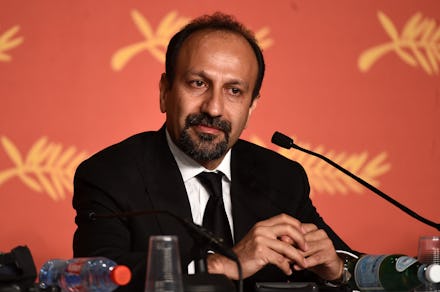Don't cancel the Oscars. Support Asghar Farhadi's work instead.

In the wake of Donald Trump's "Muslim ban," a now-blocked executive order preventing people from seven majority-Muslim countries, including Iran, from entering the United States, Iranian director and Oscar winner Asghar Farhadi declared his intention to not attend the Academy Awards.
"Over the course of the past few days and despite the unjust circumstances which have risen for the immigrants and travelers of several countries to the United States, my decision had remained the same: to attend this ceremony and to express my opinions about these circumstances in the press surrounding the event," the director, a nominee this year for his film The Salesman, said in a statement to the New York Times. "However, it now seems that the possibility of this presence is being accompanied by ifs and buts which are in no way acceptable to me even if exceptions were to be made for my trip."
In other words, even if some provision were made for Farhadi to attend despite the ban, he wouldn't. News of this, and of the ban in general, led to some calling for a cancellation of the Oscars. To do so seems like a muddled message at best, and detrimental to the cause at worst. Instead, let us offer an alternative: Instead of subtracting one event, add something by supporting Farhadi's work.
At this point, cancellation of the Oscars is basically an impossibility. They're happening Sunday, and little could stop them from going on as planned. While Vox argued that "canceling the ceremony altogether would be a bolder and more appropriate act of protest," they admitted that said cancellation was improbable — even back in January.
The impulse is understandable: Why continue with what so many consider to be a frivolous event in the wake of real concerns on the world stage? But that undersells the power of the Oscars. Think of this: Works that stand in defiance of Trump's acts as president, including The Salesman, will be honored. Actors and creators accepting awards have a platform — a megaphone, considering the size of the Oscars' audience — to say their piece. They are a vital venue.
Moreover, a trend in Trump's presidency has emerged that additive measures to protest his acts are more effective than those that are subtractive. For example, a boycott against Under Armour after CEO Kevin Plank praised Trump mostly resulted in an amorphous backlash. Trump's tweet against Nordstrom, on the other hand, inspired a rush of spending at the department store chain that led to a stock bump.
The positive is powerful — which is why supporting Farhadi's work is the best antidote to the Muslim ban.
The Salesman, Farhadi's nominee for best foreign language film this year, representing Iran, tells the story of an actor couple, Emad and Rana, performing in Death of a Salesman. They move into a new flat, where Rana is attacked, and it puts a strain on their relationship. The film is in select theaters now; the Cohen Media Group's website has a list of release dates in certain cities.
If The Salesman isn't coming to your town, however, it can be preordered from distributor Amazon Studios; additionally, one can still support the director's previous work. A Separation, Farhadi's Oscar-winning 2011 picture, is a particularly stunning film, becoming Iran's first best foreign film winner at the Oscars. The director also helmed the 2009 film About Elly; both are available for rental and purchase on streaming sites like iTunes and Amazon.
In times when protests are becoming a norm in the U.S., each individual is going to have their own approach to resistance. Some will be obstructionists; some will be progressives. Some will opt for abstaining; some will go full-out. The different kinds of protest are fine, but in this particular case, frustrations about the ban leading to the cancellation of the Oscars would deprive artists of a platform to speak out. Instead, we should redirect that frustration into benefitting an artist who deserves support.
The Oscars air on ABC Sunday at 8:30 p.m. Eastern. The foreign film race will be tight, but we'd bet viewers will hear Farhadi's name called. If he does win, it will be a small, but powerful, bit of defiance — a positive addition that shows work by Muslim creators matters greatly. Supporting Farhadi's art only amplifies that message.
Mic has ongoing coverage of the Academy Awards. Please follow our main Academy Awards hub here.